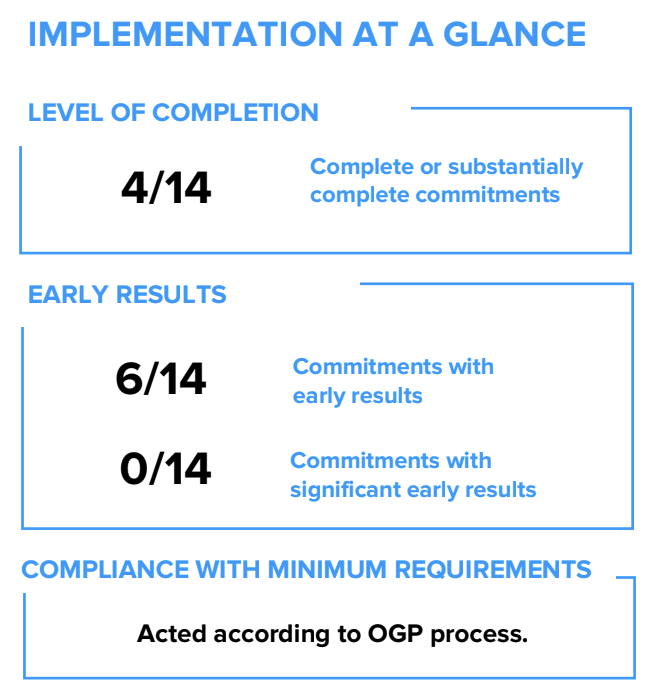Ghana Results Report 2021-2023
- Action Plan: Ghana Action Plan 2021-2023
- Dates Under Review: 2021-2023
- Report Publication Year: 2024
Ghana’s fourth action planAction plans are at the core of a government’s participation in OGP. They are the product of a co-creation process in which government and civil society jointly develop commitments to open governmen... achieved notable early resultsEarly results refer to concrete changes in government practice related to transparency, citizen participation, and/or public accountability as a result of a commitment’s implementation. OGP’s Inde... More in implementing the Access to Information Law and publishing information on companies’ beneficial owners. Gradual progress across action plans and increasingly strategic action plan design contributed to these results. Ghana’s OGP ecosystem continues to grow, with strong collaboration across the executive, parliament, and civil society.
 Early Results
Early Results
Around half of the commitments in Ghana’s fourth action plan achieved moderate early results. This report highlights two commitments that attained the most notable early results by the end of the action plan period. Under CommitmentOGP commitments are promises for reform co-created by governments and civil society and submitted as part of an action plan. Commitments typically include a description of the problem, concrete action... 9, competent authorities and the public can now access information on companies’ beneficial owners.
Ghanaian reformers have strengthened implementation of the Access to Information Law and operationalization of the Right to InformationThe legal right to request information from the government allows the public to follow government decision-making, participate in ensuring better decisions, and hold the government accountable. Techni... Commission through Commitment 11. Notably, journalists and civil society are already using the information made available under Commitments 9 and 11 to contribute to transparent and accountable governance in Ghana.
Moderate progress was made in the areas of public sector auditsInstitutional and legal frameworks are necessary for providing assurance of the integrity of financial information and of compliance with budgetary rules and procedure. Technical specifications: These..., transparencyAccording to OGP’s Articles of Governance, transparency occurs when “government-held information (including on activities and decisions) is open, comprehensive, timely, freely available to the pub... More of state-invested agencies, and opening parliament. Through Commitment 1, the Internal Audit Agency and civil society collaborated to strengthen implementation of audit recommendations. Progress was also made to strengthen transparency of state-invested agencies under Commitment 7. An Open ParliamentEnsuring access to legislative information and creating mechanisms for public participation are critical to building an open, trusting relationship with citizens. Technical specifications: Commitments... More Caucus and Citizens’ Bureau was established through Commitment 13. An Open Parliament PlanMany parliaments have engaged in the OGP process by co-creating and implementing their own open parliament plans, alongside the typical OGP national action plans. Technical specifications: indicates t... was drafted but not finalized by the end of the implementation period. While progress was made, these commitments are not highlighted in this report as results were not yet observable.
CompletionImplementers must follow through on their commitments for them to achieve impact. For each commitment, OGP’s Independent Reporting Mechanism (IRM) evaluates the degree to which the activities outlin... More
Of the 14 commitments, only 5 achieved a substantial level of implementation progress. The remaining 9 commitments achieved limited or no progress during the two-year period. This represents a slight improvement from previous action plans. Challenges included disengaged implementing institutions, funding shortfalls, and delayed legislative processes. Meanwhile, commitments that prioritized implementing existing legislationCreating and passing legislation is one of the most effective ways of ensuring open government reforms have long-lasting effects on government practices. Technical specifications: Act of creating or r..., such as the Right to information Law and Companies Act, achieved greater progress. The adoption of a four-year timeline for Ghana’s next action plan has the potential to raise levels of completion and early results.
Participation and Co-Creation
Ghana’s OGP Secretariat and Steering Committee, including representatives of implementing agencies, civil society, and parliament, continue to oversee action plan co-creation and implementation. The Committee strengthened implementation processes by developing a monitoring and evaluation matrix.[1] The Committee then used information gathered through the matrix to facilitate communication and problem-solving across implementers and partners.
Ghana revised its fourth action plan following recommendations from the Action Plan Review.[2] Notable amendments included inclusionOGP participating governments are working to create governments that truly serve all people. Commitments in this area may address persons with disabilities, women and girls, lesbian, gay, bisexual, tr... More of public-facing milestones for commitments whose activities were all internal to government, better clarification of the problem to be solved, alignment of commitment objectives with existing political and institutional frameworks, and addition of new workflow systems (such as monitoring and evaluation systems, review of forms etc.). This assessment is based on the revised action plan.
[1] Ghana’s OGP repository, Google Drive, https://drive.google.com/drive/folders/1kzcbjjX7n6PlkdFgCEVGyzlpaezgZIIX
[2] Open Government Partnership, Independent Reporting Mechanism, Ghana’s 2021-2023 Action Plan Review, https://www.opengovpartnership.org/documents/ghana-action-plan-review-2021-2023/

Leave a Reply